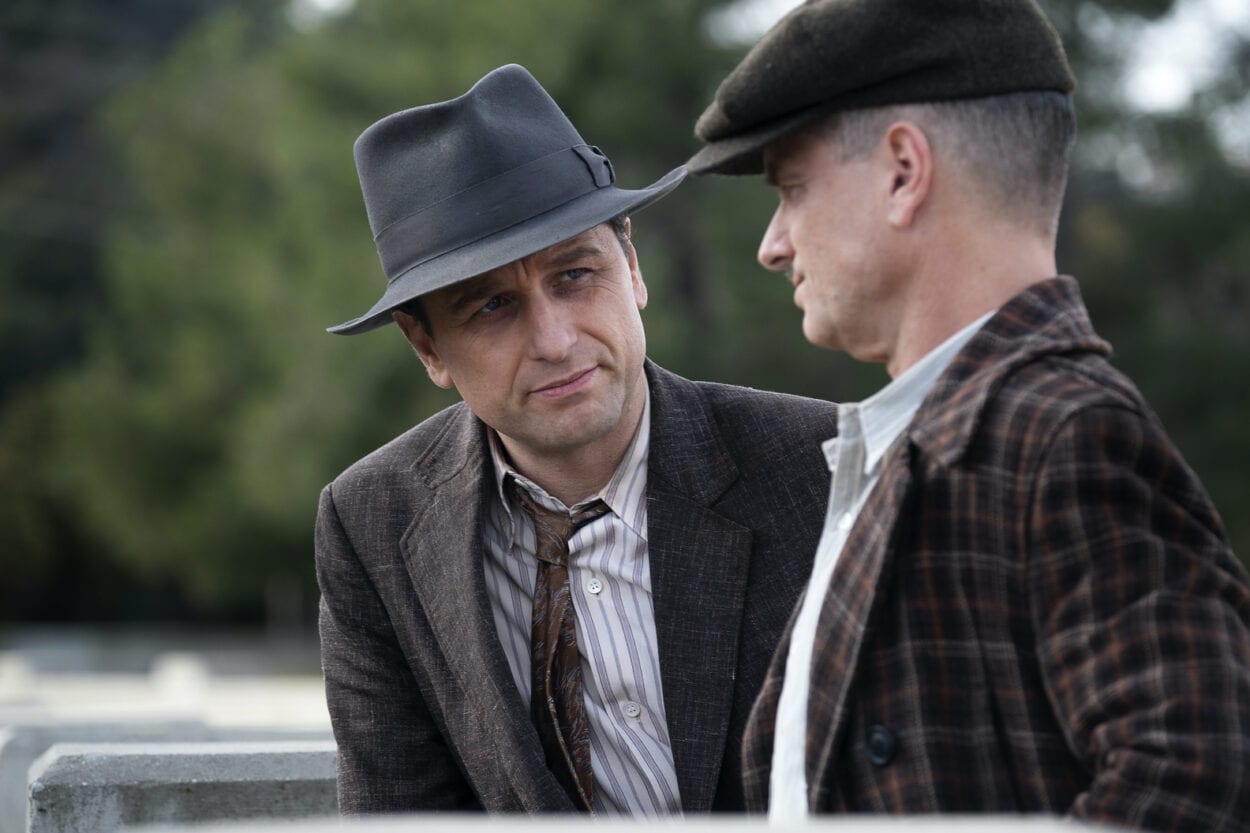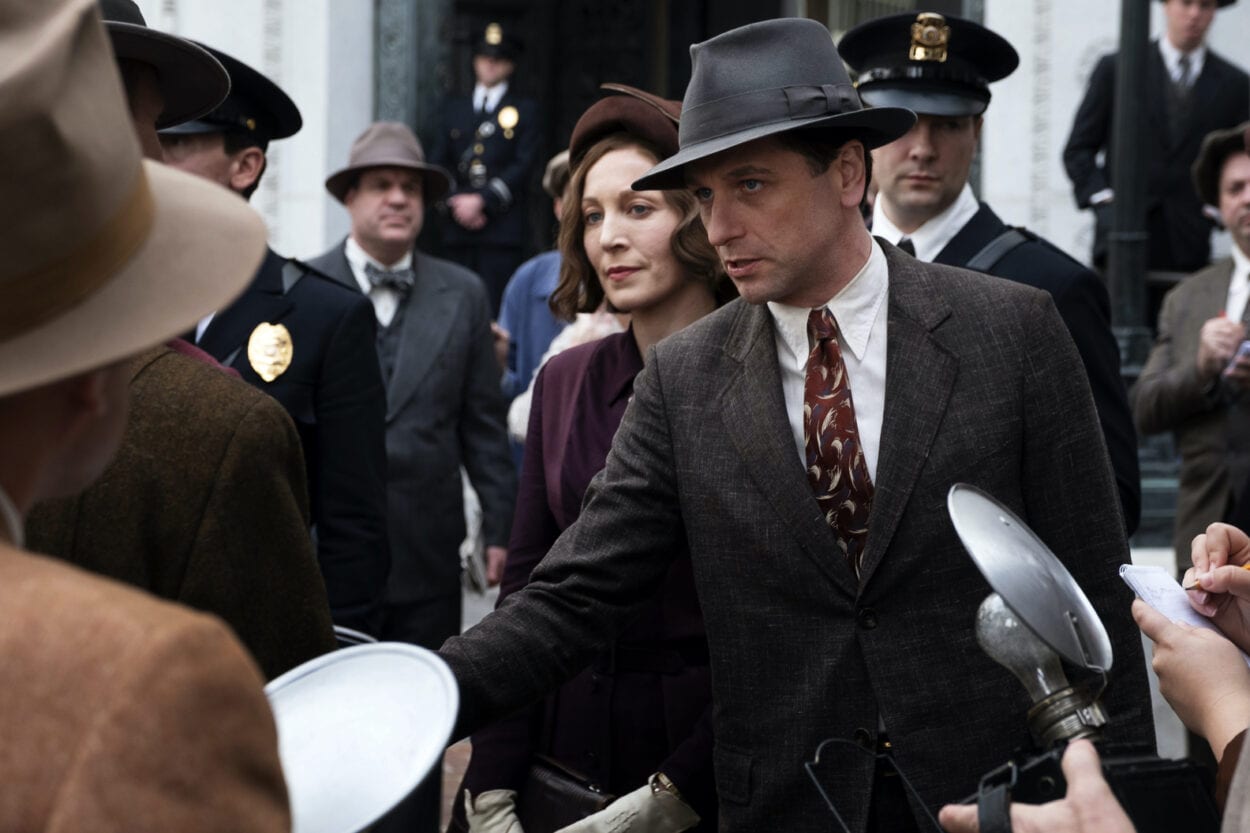Perry Mason S1E8 brings the Dodson case to a close in a way that I must admit was somewhat unexpected. I had been presuming that HBO’s Perry Mason would line up with classic Perry Mason in terms of him proving his client’s innocence in court by getting the guilty party to confess, or something like that. Instead, the scene where Perry gets Ennis to confess in S1E8 turns out to be a fantasy. It’s Mason rehearsing his plan until Hamilton Burger protests that things will absolutely not go like this in court. Judge Wright won’t deem Ennis a hostile witness, and Ennis himself will surely not confess on the stand. Instead, he says Perry should rest his case, having established reasonable doubt through the information about the Radiant Assembly’s finances.
This is an interesting turn for the show to take. It at once gives us the classic confession on the stand we’ve been expecting and calls into question the plausibility of that modus operandi in the real world. Instead, Della convinces Perry to put Emily on the stand, and whether that impacted the jury or not, they ultimately secure a mistrial.
This makes HBO’s Perry Mason a bit like Rocky. You’ll recall he didn’t win in the first film, though he secured what you might think of as a moral victory. On the other hand, Mason’s victory (if we can call it that) in S1E8 is a rather immoral one. He has Strickland pay off a juror. And though we learn that there were two other jurors who also held out, raising the possibility that the payoff was unnecessary, it’s hard to know that for sure. Often jurors are persuaded to go along with the majority of the group. Would those two have continued to hold out for five days without the tenacity of the one who was being paid to bolster their resolve?

There’s what’s legal, and there’s what’s right. But even if it is right for Emily to go free, does that justify this level of corruption? Do we really want to say that it is right to fight a corrupt system by becoming corrupt oneself? Because this isn’t about finding a way to slip in real evidence that the police have ignored, it’s about a lack of faith in the people of the jury. To bribe one of them is to undermine the whole idea of how our justice system is supposed to work.
Equally, when Holcomb has Ennis killed, does this feel like justice? It would seem that I was wrong in guessing that Birdie McKeegan was involved in the kidnapping—or at least we never learn that she was—and that the buck did indeed stop with Ennis, but he isn’t exposed and brought to justice. In a way, nothing threatens justice more than the vigilante who takes the law into their own hands. The important thing isn’t the result but the process, as frustrating as that may be. If we can’t trust it because it is corrupt (as it is in Perry Mason), then there is no justice. Revenge is not justice, and neither is a lynch mob.
Of course, Holcomb isn’t even thinking about justice. This is all about his self-interest. His partner has gone too far and opened them up to way too much risk with his actions. Take money from the casino and the brothel to look the other way, sure, but kidnapping a baby? There are too many ways for that to go wrong, as they did with the Dodson case. And even if they got through it relatively unscathed, he just can’t trust Ennis anymore.
Charlie Is Risen
Meanwhile, Emily hooks up with Birdie to become part of an act, claiming that the random baby is her Charlie resurrected despite the fact that the only resemblance is that this baby also seems to like turtles. (So I guess that’s all there was to that.) Sister Alice has gone missing, and the Radiant Assembly is prosecuted by Hamilton Burger for their financial crimes, so it’s back to tent revivals for Birdie.
Emily’s involvement is interesting to think about. She knows that it is all a scam, but it gives her purpose, and I imagine she is happy to have a baby to take care of. Yet she is in a way exploiting her dead son or tarnishing his memory. I suppose how you take that might depend on how you think about the ethics of honoring the dead. Most people seem to think that doing so is important, but if you think about it, it’s hard to see that the dead could care.
Paul Drake quits the police to become Perry Mason’s investigator full-time, and he gives back the money he’d been given after he testified in court. Here we see another case where the ethical question is a bit ambiguous. On the one hand, it is easy enough to understand the thought that this is tainted money that he doesn’t want anything to do with. But does that line of thinking hold up to scrutiny? Would there really be something wrong about keeping that money while also cutting ties with the corrupt forces who gave it to you?
Della Street lays out her plan to become Perry’s partner after continuing in her present role and attending law school for the next two years. Thus the core group we are familiar with from classic Perry Mason has come together by the end of S1E8, and Hamilton Burger is on his way to becoming District Attorney. There are differences, but one can still imagine all of this as a kind of prequel to the Mason we know from the classic show. We even get a woman in distress who arrives to the office seeking Perry’s help.

The most interesting aspect of HBO’s Perry Mason remains to me the story of Sister Alice, however. We don’t see much of her in S1E8, but the implications of the fact that she really did flee at the end of S1E7 run deep. Now she’s working at a diner.
She’s realized that her mother always thought she was a fraud and encouraged her solely for the sake of making money. Whether she has come to think of herself as a fraud is a more difficult question. Perhaps she merely decided to live a quieter life of faith, though her comments to Perry when he finds her might suggest instead that she no longer believes. She strikes me as living within the question.
Did she really think she could resurrect Charlie? Is it merely a jab at Birdie when she suggests that she did?
Alice and Perry are tired of being alone, but they always will be, won’t they? Why is that? It’s not for a lack of people around them. What makes them alone is how they stand apart from others, insistent on a pursuit of the truth regardless of whatever social pressures might stand in their way. For Mason that’s justice, while for Alice it’s God, but there is a structural similarity to how those concepts operate for them. How do you believe in justice when those who are supposed to stand for it form a system that is thoroughly corrupt? How do you believe in God when those who claim to speak in his name exploit and deceive others for profit, or kowtow to public opinion instead of holding to Christian ideals?
Of course, the wrinkle is that Sister Alice believes in hokum like faith healing and speaking in tongues. Robert wasn’t healed, and blaming his lack of faith just seems mean. But if we suppose that she believes that she can do the impossible, to what extent do Perry’s beliefs run in a parallel fashion? Doesn’t justice seem impossible in this world?
It will be interesting to see how that question develops as Perry Mason continues into a second season. With the way the pieces are aligned at the close of S1E8, one might expect the plot of Season 2 to more strongly resemble a classic Perry Mason story, but the HBO series has consistently subverted those tropes even as it has paid homage to them. So I suppose we will have to wait and see.


Interesting analysis. I admit to feeling unsatisfied with this season. It feels to me like the creators subverted for the sake of subversion. And the resolution, such as it is, did not resonate with me. However, I enjoyed the performances and the production quality is first-rate.